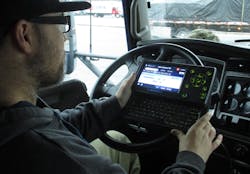Court challenge to ELD rule 'meritless,' government filing says
The Federal Motor Carrier Safety Administration dotted all the ‘i’s and crossed all the ‘t’s in the electronic logging device rulemaking, and the legal objections by the Owner-Operator Independent Drivers Assn. are variously “mistaken,” “erroneous,” “wrong,” and “meritless,” the U.S. government argues in a response brief filed this week.
OOIDA filed suit to block the implementation of the ELD rule on Dec. 11 last year, the day after it was published. The small business trucking group had blocked the agency’s previous try at mandating electronic logs to track hours of service compliance, successfully arguing that the 2010 rule didn’t address driver harassment. And OOIDA once again has petitioned the 7th Circuit Court Appeals with similar arguments.
Along with the driver harassment issues, OOIDA says the new rule is “arbitrary and capricious” because the ELDs, under the device specifications, would not be fully automatic as called for by Congress, nor does the rule adequately secure the confidentiality of personal data. OOIDA also argues that the costs and benefits of ELDs were not considered in the rulemaking and that the rule violates the Fourth Amendment rights of drivers by authorizing warrantless searches.
Driver harassment
In its point by point response, the government contends the rule incorporates driver harassment protections based on public comment and the input FMCSA received in public listening sessions on the matter. Along with a specific prohibition on driver harassment, the agency adopted a procedure for drivers to file written complaints of harassment by a motor carrier. Additionally, the devices must be equipped with a mute function or volume control that automatically engages, or allows the driver to turn the sound off, when a driver enters in sleeper berth status, the filing states. ELDs also “keep a record of interactions” between driver and motor carrier, increasing the transparency of what occurs to protect drivers from harassment.
Along with the harassment protections, the government also points out that the rule includes broad coercion provisions that cover the driver’s interaction with shippers, receivers and brokers.
Automatic recording
Because the ELDs, as specified,” do automatically record when a driver is in on-duty driving status and for how many hours,” the government contends the rule is “consistent with Congress’ instruction.”
“Petitioners erroneously argue that an ELD may not require any manual inputs at all,” the response reads. “Congress gave no indication that the agency must adopt the radically new and highly intrusive technologies that would be required to record every duty status automatically – such as bio-monitors to record automatically when a driver is sleeping, and in-cab surveillance video cameras to record automatically whether a driver is on-duty not driving or off-duty.”
The government also rejects OOIDA’s claim that, because some manual inputs are required, ELDs are no better at achieving HOS compliance than paper logs. FMCSA’s “real-world experience with monitoring devices” has confirmed that such devices “dramatically improve compliance,” the filing states.
Cost-benefit analysis
The government contends FMCSA was not statutorily required to do a cost-benefit analysis at all, unlike with most rulemakings, and OOIDA’s objections are “meritless.”
“For ELDs, Congress did the weighing itself and simply ordered the agency to promulgate a rule requiring ELDs,” it says.
Still, FMCSA did extensive research and relied on real-world data from carriers to determine the devices will improve compliance and save lives, the filing adds.
Confidentiality
The rule “takes appropriate measures” to preserve the confidentiality of personal data contained in ELDs, the government contends. FMCSA relied on existing laws and regulations dealing with the protection of private information, as well directing both carriers and enforcement on privacy procedures. Additionally, the rule requires ELDs have secure access to data and use encryption methods while transferring data.
“Petitioners’ brief contains only vague assertions that the agency should have done more, without specifying exactly what additional procedures they desire or explaining why the provisions adopted are not ‘appropriate measures’ as Congress required,” the government argues.
4th Amendment
ELDs do not violate the 4th Amendment, as they are neither a “search” nor a “seizure,” the filing says.
Additionally, ELDs are not “surreptitiously” attached to a vehicle by the government, but are installed by a carrier openly and pursuant to regulation with the knowledge of the carrier and driver.
“Nor do ELDs violate any reasonable expectation of privacy because they do not precisely track vehicles in real-time, but only intermittently record location within a 1-mile radius,” the government states. “Even if there were a search or seizure, ELDs would be a permissible warrantless inspection of a closely regulated industry.”
Pending a successful legal challenge, the ELD rule is set to take effect in December 2017.
About the Author
Kevin Jones 1
Editor
Kevin has served as editor-in-chief of Trailer/Body Builders magazine since 2017—just the third editor in the magazine’s 60 years. He is also editorial director for Endeavor Business Media’s Commercial Vehicle group, which includes FleetOwner, Bulk Transporter, Refrigerated Transporter, American Trucker, and Fleet Maintenance magazines and websites.
